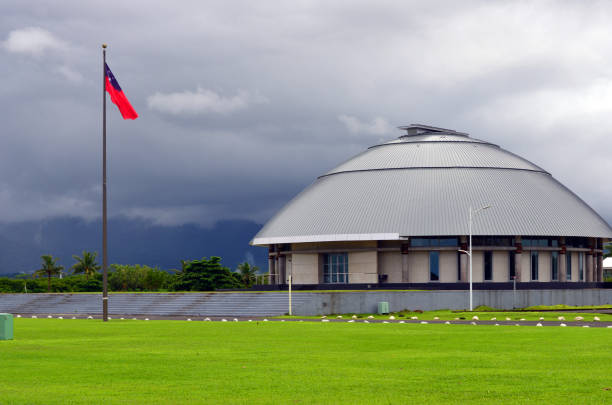What started as predictions of a nail-bitingly close election in Samoa turned into a stunning landslide for FAST party leader La’auli Leuatea Schmidt—a politician facing ten criminal charges who had been expelled from his own government just months earlier. The August 29 snap election delivered one of the Pacific’s most dramatic political comebacks, leaving Samoa’s first female Prime Minister with just three seats and raising serious questions about democracy and accountability in the island nation.
A Decisive Victory Against All Odds
Expectations that Samoa’s 29 August snap election would deliver a close, perhaps even indecisive, result lasted less than nine hours after the close of voting. Final counting showed that the Fa’atuatua i le Atua Samoa ua Tasi (FAST) party had scored a comprehensive victory.
The flow of ballots to FAST was so decisive that it begs the question of what explains such a stunning result for a party formed just before the 2021 election, which was beset by an internal split so acrimonious that it caused the snap election and was headed by a politician facing ten police charges.
Going into the election, FAST, led by party founder La’auli Leuatea Schmidt, had held 20 seats but had captured 30 of the 51 seats in the Legislative Assembly through effective social media and “roadshow” campaigning.
The Human Rights Protection Party (HRPP) hoped to turn around the 2021 loss that ended nearly four decades of political dominance. However, losing four seats, HRPP leader, Tuilaepa Sailele Malielegaoi, only delivered the 14 seats down from 18 held previously.
The Fall of Samoa’s First Female Prime Minister
The election was a stunning fall from grace for Samoa’s first female prime minister, Fiamē Naomi Mata’afa. Her Samoa Uniting Party (SUP), which did not exist when the election was called, only won 3 seats, including hers.
Ironically, the creation of the SUP may have been the key underlying reason for the FAST win.
SUP was created as a vehicle for the minority government, composed of the 14 ministers who remained loyal to Fiamē after the schism within the governing FAST, when the PM sacked La’auli for refusing to stand down during a police investigation. He retaliated by expelling her and several other ministers from the party.
The Scapegoating Strategy That Worked
It was the brave decision by the 15 members of Fiamē’s minority government to contest the election together under the new party label that significantly contributed to FAST’s electoral success.
Fiamē’s government was blamed, inter alia, for cost-of-living pressures, infrastructure failures, particularly a collapse in the electricity supply and a dengue outbreak during the campaign.
Due to Fiamē’s caretaker government running under the new SUP banner and to artful campaign gaslighting by FAST, FAST was largely successful in deflecting blame for its role in setting policy for virtually all of the four years before the snap election.
It is difficult to know how FAST would have fared had the election been fought without the split in the party. Nevertheless, it was clear from the campaign that anti-government sentiment was directed against SUP rather than FAST, and FAST benefited from this scapegoating in terms of electoral support.
The Mathematics of Power
Just how broadly the incoming FAST Government will be able to utilise its majority may depend on the choice the four elected Independents make upon entering the new Legislative Assembly. If past is prologue, most will re-align themselves as FAST members on entering the Assembly as they are allowed to do.
Historically, this has been relatively common across Samoan politics because villages want their member to join with the winning side to enable them to enjoy influence and the rewards of government largesse.
Having a two-thirds super majority in Parliament enabled an earlier HRPP government to make the constitutional changes as easily as passing a statute. These constitutional amendments set Samoa on the path to transitioning from a parliamentary democracy to a party democracy and contributed to the constitutional crisis in 2021.
Unfinished Business: Court Challenges and Women’s Representation
However, there are at least two more scenarios to play out before the 2025 snap election has entirely run its course.
Challenges to successful candidates are so common that the special elections’ court (essentially a court of disputed returns) has set a November time limit in its calendar for hearing candidate challenges. After the 2021 election, 20% of the seats were challenged and went to trial.
Challenges can arise from electoral violations such as bribery, treating and vote buying that are the standard forms of electoral corruption elsewhere. However, Samoa has its own unique violations arising in Samoa’s fa’amatai (chief-based) political system.
Customary practices entrenched in electoral law, such as monotaga (village service), which is required for eligibility to stand, can appear subject to arbitrary partisan decisions by village authorities. Challenges based on customary obligations are both common and complex.
The second scenario can also be determinative in the final number of members who take a seat in the Maota Fono (parliament house). Still, it only comes into play after the candidate challenges have been resolved.
A 2013 constitutional amendment requires that women constitute at least 10% of the seats in Parliament. The percentage figure adopted for the amendment was based on the calculation that only one in ten matai (chief) titles were held by women.
If the declared contests for the country’s 51 parliamentary seats do not elect six women members, the results are reviewed to fill as many additional seats from the highest polling losing women candidates.
The results in the 2021 election between HRPP and FAST were so tight that a court case ensued to determine the point in the electoral process at which a determination would be made to activate the constitutional provision. At that time, when or if an additional women’s seat was needed, it could have flipped which party formed the Government.
Five women have been elected in 2025, making an additional seat necessary, but this will not be filled, if necessary, only after the final gender balance has been settled following the court challenges and any subsequent by-elections.
The final result may not be known definitively until November, when the number of seats in the Parliament and the party distribution in the Assembly are resolved.
Political Consequences and Future Uncertainties
The size of the FAST win makes it highly unlikely that there is any threat to a La’auli-led Government, but the ease with which the constitution can be amended could be at issue. Other political consequences of the election are clearer now.
The SUP has not reached the threshold of eight to be recognised under standing orders as a parliamentary party. Thus, Fiamē will only have the status of a private member on the floor of the Assembly, and, historically, Samoa’s procedures have not been kind to private members.
Importantly, Fiamē’s absence from the regional stage will be felt by the wider international community, as she was a proven and respected regional leader. La’auli has seemed disinterested in taking on this role.
For HRPP’s Tuilaepa, this second electoral defeat may be consequential. There is a question as to whether he will remain in his leadership position. Some feel that defeat in two successive elections should see him replaced, especially as he would be 85 at the next election.
La’auli’s Position and Governing Challenges
La’auli’s standing within the party he founded and led to the upset victory in 2021 could scarcely be higher. He more than weathered the split in FAST; he provoked and proved that 2021 was not an aberrant election but a realigning one.
A practical limiting factor for La’auli on spending the political capital of his success may be ministerial inexperience. La’auli’s incoming government will be bereft of experienced talent, as the largest share of 2021 FAST ministers defected to SUP in the FAST party split.
If there is any threat to his leadership, it is more likely to come from outside the party. The rift between La’auli and Fiamē was driven by the PM’s demand that La’auli stand down during a police investigation into criminal action against him. Fiamē sacked him from the ministry when he refused.
With Trumpian echoes, La’auli’s critics, including Tuilaepa, claimed his move against Fiamē was to take over the prime ministership to avoid prosecution. La’auli will now be the prime minister, and many will be watching to see what happens to the case against him.
Despite the predictable uncertainties in the immediate future as the election results are bedded down, there is a noticeable sense of relief that the parliamentary infighting is over.
Richard Herr OAM is a life member of AIIA TAS and inter alia a former President of the Tasmanian Branch. He has served as a consultant on various aspects of Pacific Island regional architecture for four decades.
This article is published under Creative License and may be republished with attribution.





